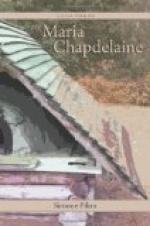“He went astray ... The storm caught him in the burnt country and he halted for a day. So much we know, for the Indians found a shelter of fir branches he had made for himself, and they saw his tracks. He set out again because his provisions were low and he was in haste to reach the end of his journey, as I suppose; but the weather did not mend, snow was falling, the nor’west wind never eased, and it is likely he caught no glimpse of the sun to guide him, for the Indians said that his tracks turned off from the river Croche which he had been following and wandered away, straight to the north.”
There was no further speech; neither from the two men who had listened with assenting motions of their heads while they followed every turn of Eutrope’s grim story; nor from the mother whose hands were clasped upon her knees,—as in a belated supplication; nor from Maria . .
“When they heard this, men from Ouatchouan set forth after the weather was a little better. But all his footsteps were covered, and they returned saying that they had found no trace; that was three days ago is lost ...”
The listeners stirred, and broke the stillness with a sigh; the tale was told, nor was there a word that, anyone might speak. The fate of Francois Paradis was as mournfully sure as though he were buried in the cemetery at St. Michel de Mistassini to the sound of chants, with the blessing of a priest.
Silence fell upon the house and all within it. Chapdelaine was leaning forward, elbows on his knees, his face working,— mechanically striking one fist upon the other. At length he spoke:—“It shows we are but little children in the hand of the good God. Francois was one of the best men of these parts in the woods, and at finding his way; people who came here used to take him as guide, and always did he bring them back without mishap. And now he himself is lost. We are but little children. Some there be who think themselves pretty strong-able to get on without God’s help in their houses and on their lands...but in the bush...” With solemn voice and slowly-moving head he repeated: “We are but little children.”
“A good man he was,” said Eutrope Gagnon, “in very truth a good man, strong and brave, with ill-will to none.’
“Indeed that is true. I am not saying that the good God had cause to send him to his death-him more than another. He was a fine fellow, hard-working, and I loved him well. But it shows you ...”
“No one ever had a thing against him.” Eutrope’s generous insistence carried him on. “A man hard to match for work, afraid of nothing and obliging withal. Everyone who knew him was fond of him. You will not find his like.”
Raising his eyes to Maria he repeated with emphasis:—“He was a good man, you will. not find his like.”
“When we were at Mistassini,” began Madame Chapdelaine, “seven years ago, he was only a lad, but very strong and quick and as tall. as he is now-I mean as he was when he came here last summer. Always good-natured too. No one could help liking him.”




